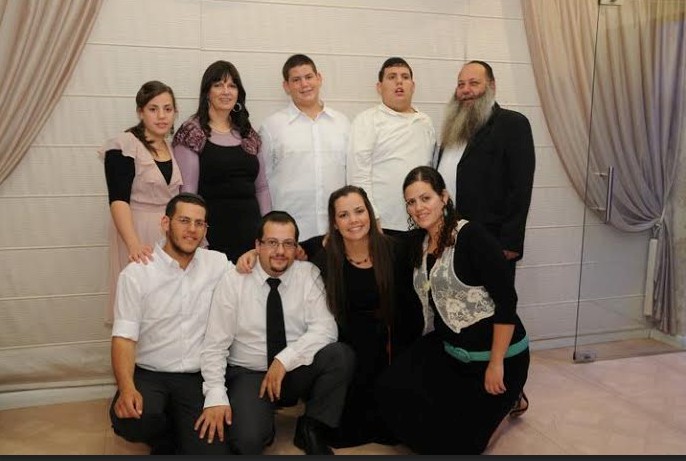Larger than Life: Ayelet Savir Triumphs Over Cancer
Ayelet Savir, daughter of beloved children's entertainer Ariela Savir, who accompanied children with cancer at Schneider Hospital, was diagnosed with cancer herself a year later. She shares her emotional journey of overcoming challenges and her path to recovery and joy.

The optimistic smile that Ayelet Savir wears doesn't reveal the struggles she has faced over the past three years. Shortly after volunteering at the 'Ezer Mizion' organization and accompanying children with cancer, she discovered at the age of 18 that she herself had fallen ill. Yet, it appears that the fifth daughter of the beloved and blind children's entertainer, Ariela Savir, knows how to confront life's challenges with joy and courage.
Read more:
In a Different Direction: Kobi and Ariela Savir
The Warrior: The Story of Ariela Savir
She was born 21 years ago on the 18th of Tishrei, a time when the Jewish people are commanded to sit in the sukkah. Her younger brother Haggai, known as the family's prince, was born after her. "How is it to grow up in such a family?" people often wonder. But for Savir, it’s not surprising. She’s used to these sorts of questions from an early age. "Since I was young, friends would ask me, 'How does your mom do laundry if she can't see? And how does she cook? And how... how does the food even come out tasty? Isn’t it hard to grow up like this?' she recalls.
 The Savir family in full
The Savir family in full"No, it's not hard for me," Savir replies with a charming smile, "I've never understood why people ask these questions—this is the reality I was born into. For me, it’s the most natural thing in the world that my mom does everything so well, and it has nothing to do with her being blind. The home where I grew up is the most amazing in the world. My mom is a champion in everything she does—her food is the tastiest, but that’s not obvious at all.
"Some might say that growing up in such a family is a difficult challenge, that perhaps I wrestle with a thousand questions like 'Why me?'—but the truth is, I never asked such a question or thought about it that way. To me, my special family is the most amazing thing. My parents, may they live long, have done and continue to do an amazing job in education. Each of my siblings, including Haggai, is unique and outstanding in their own way. This reality in which we grew up only improved us."
The Call from Ichilov
Her parents’ unique path, becoming religious before she was born, shaped her ability to embrace those different from her and accept them as they are. This also helped her confront the challenge—the battle for her life. "Thanks to my parents' journey to religious observance, I had the privilege of being educated in different frameworks, including Beit Yaakov, Chabad, and Yeshiva. From exposure to various streams and perspectives, I learned my most important insight: that from every person there is spiritual benefit—a small lesson I can and should learn. Yes, even if they think differently from me, even if their path differs from mine. This is how I will educate my children. I'm sure much of who I am today was crafted thanks to the good I received from everyone."
In the eighth grade, during the Second Lebanon War, the Savir family moved from Safed to Karnei Shomron. "The move was one of the best things that happened to me," she recalls, "At an age when everyone is searching for themselves, I felt I found myself. I absorbed a lot of love for the Torah, the nation, and the land during those years." Savir successfully completed her twelfth grade with a diploma. "I was never one of the highest-scoring students, but I also made sure not to veer into a negative extreme," she says.
As a young and energetic adolescent, Savir planned to work for two years in the national service, guiding at the Bnei Akiva movement. But then cancer threatened to halt everything and reshuffle the cards. After successfully passing the screening tests and meeting with the mentoring team in her assigned settlement, she was deep into preparations for her role when she received that phone call from Ichilov Hospital's secretary.
"They said test results had come in and I must urgently come to the hospital for an appointment with the doctor," Ayelet recalls.
How did you take it?
"I was a bit in shock. I didn't understand the fuss or why they were urging me to come quickly. I mean, what's the rush? I explained I was scheduled to start national service in two weeks and had lots of errands—but my pleas to delay the hospital visit were unsuccessful. That same week, I went to meet the doctor with my dad."
The meeting with the doctor is etched in her memory. She clearly recalls the moments when he shifted uncomfortably in his chair. He was embarrassed, unsure how to soften the painful reality he had to convey to the young girl, who had her whole life ahead of her. "Suddenly, he told the happiest and most optimistic girl in the world that it had been discovered I had advanced skin cancer and that I needed to start radiation therapy that same week. If that wasn’t enough, the doctor also informed me that I would have to travel from Jerusalem to Tel Aviv three times a week for repeated treatments until the metastases disappeared."
Everything Happens for a Reason
Savir didn’t let the hard news discourage her. As an optimistic and cheerful girl, she thought at the time: 'It’s nothing; I’ll get through it.' "I was sure I’d manage to combine the radiation treatments with national service, but unfortunately—the doctor contradicted all the castles I’d built in my imagination. Instead, he prepared me mentally that I would have to completely forgo national service to focus on 'how to overcome this thing' that was digging into my skin. My family took the news harder than I did—the mere mention of the word 'cancer' and the usual associations of hair loss, vomiting, weakness, lack of life, and so on were impossible for them. I didn’t see it that way. It was clear to me that if this was the challenge, it was from Heaven and there was no place to question 'why'. I was glad that at least it was on my skin—an external and easy-to-treat place—and not in internal organs."
Two weeks passed and Savir enlisted in national service despite it all, without sharing a word of what she was going through with the staff. She knew it was a matter of time. That the trial would pass as quickly as it had come. However, after a month of treatments alongside guiding the movement, reality hit her, and she understood what the doctor meant when he said it wouldn’t work, and she left the scene. "The doctor was right. The treatments weakened me immensely, and my performance in service was nil. I had to leave, but with all the pain in this—in those moments I encouraged myself and kept repeating: Hashem knows exactly what He is doing, why this is happening to me, and why now. I never doubted my faith in Hashem. I knew that everything that happens is solely for my good."
Agree with me, that seeing a 21-year-old girl with skin cancer who talks in such a faith-based, optimistic way about life—isn't something you see every day. How do you do it? Where do you find the strength?
"The truth? You won’t believe it, but a year before I fell ill, I volunteered with the Ezer Mizion organization with children suffering from cancer, who were hospitalized in the oncology department at 'Schneider' hospital. There's nothing harder than seeing small and helpless children dealing with this disease. I was with them at a summer camp and tried to bring them joy as much as possible. In retrospect, when I remember it today—I think that the entire encounter with them wasn’t for nothing... everything returned to me a year later. It wasn’t coincidental that I was there for those families who needed a smile, who longed so much to see their child laugh or someone to listen to them. A year later, I felt how much I needed those things too, so my giving served me in the same measure."
Joy Heals
Though she had to forgo national service, life—not at all. Between odd jobs and radiation therapy, Savir enrolled in a makeup course, completed it successfully, and began working as a professional makeup artist where she lived. "I decided there's no way I’m becoming a character of a miserable, neglected patient," she says boldly, "On the contrary, this situation—this is the time to invest in myself. I’ve always loved makeup because it helped me make women love themselves and how they look, and even today, my motto is that it doesn’t matter what you’re going through—look good, put a smile on your face—why not?
"Many times I hear people say, 'If I’m healthy, I’ll be happy.' But I say, 'If I’m happy, I’ll be healthy.' Joy heals everything. Just last Passover, I was told, thank God, that my health has improved. My doctor claims it's still impossible to say that it's all behind me, but I claim it’s possible and desirable to say the disease has passed and ended. If we believe in something and keep claiming it until everyone around us is convinced—it will happen. Everything depends on our patience to believe. True, there are moments of breakdown, that's allowed sometimes, but it's a shame to invest energy in the wrong things. When I experience a drop in mood, I immediately play happy songs that I love, pop a piece of chocolate, grab a friend or another close person for a chat to unload, and move on."
To smile, rejoice, volunteer, travel, compliment herself with a kind word that can impact the whole day, to love life—for Ayelet, these are not empty slogans. These are her life.
Watch the "In a Different Direction" program with Ariela and Kobi Savir:

